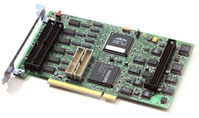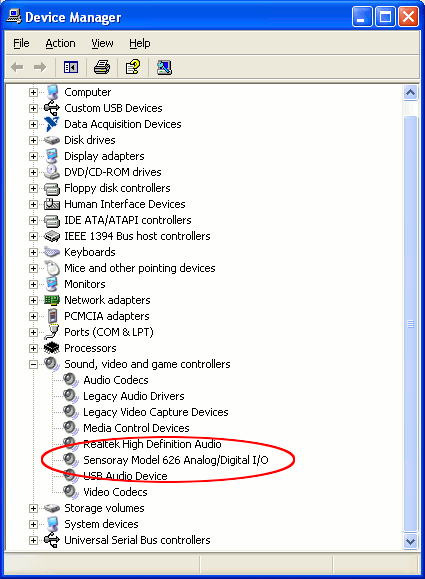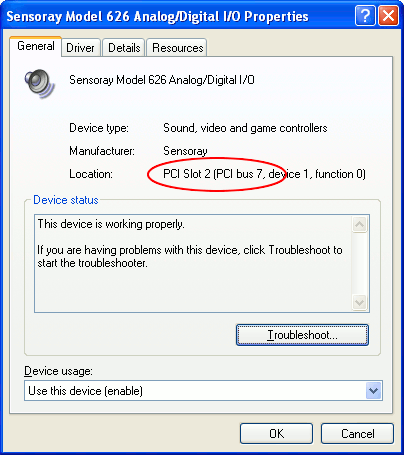

Sensoray Model 626
The Sensoray Model 626 is an multifunction I/O card for PCI slots. For more information, visit the website for the Sensoray Model 626.

The QUARC driver name for this card is sensoray_model_626.
 The Sensoray Model 626 data acquisition card (i.e., HIL board) has been deprecated as it is only supported under 32-bit Windows XP.
The Sensoray Model 626 data acquisition card (i.e., HIL board) has been deprecated as it is only supported under 32-bit Windows XP.
Installation Requirements
 In order to use the Sensoray Model 626 in QUARC, the card driver must be installed. If you are migrating from WinCon, then you will also need
to follow this installation proceedure as it differs from the WinCon driver. You can download the SDK from
http://www.sensoray.com/downloads/sdk_626_win_1.0.5.zip. Follow the driver
installation instructions inside the zip file Windows\Install 98-ME-2000-XP folder. You will need to reboot your computer after installing
the driver.
In order to use the Sensoray Model 626 in QUARC, the card driver must be installed. If you are migrating from WinCon, then you will also need
to follow this installation proceedure as it differs from the WinCon driver. You can download the SDK from
http://www.sensoray.com/downloads/sdk_626_win_1.0.5.zip. Follow the driver
installation instructions inside the zip file Windows\Install 98-ME-2000-XP folder. You will need to reboot your computer after installing
the driver.
Configuration
To select the Model 626, pass sensoray_model_626 as the card type argument to the hil_open function.
If you only have one card installed in your system, then you can enter 0 for the Board identifier and the QUARC driver will automatically find the card. If more than one card is installed in your system, that you must identify each board by its slot and bus number. To determine the bus and slot numbers of your installed cards, open the Device Manger in the Windows control panel. You will find the card installed under the Sound, video and game controllers group as shown below:

Double click on the device to open the device properties. Take note of the slot and bus number as shown in the example below:

Pass the following as the card_identifier argument "slot=1;bus=7" (substituting the slot and bus number that you previously noted) to the hil_open call. Note that there are no spaces in the string, and the text is all lowercase. The slot and bus number may or may not have any physical relation to the actual location of the card in your PC.
Clocks
The Model 626 has 6 counters which can be configured for use as clocks, or quadrature decoding counters.
To set the mode of the clocks, use the hil_set_clock_mode function.
Analog Inputs
The Model 626 supports 16 analog inputs (channels 0 to 15) with 16-bit resolution.
The valid input ranges are ±10V, and ±5V.
To change from the default range of ±10V, use the hil_set_analog_input_ranges function.
Note that the Model 626 is designed to support oversampling. If a single channel is referenced multiple times in a hil_read_analog function, it will be read multiple times during a single time sample. This can be useful for averaging to reduce noise.
| To get the best performance, all analog reads should be performed from a single hil_read_analog call. If multiple analog input reads must be used, the fastest sample period that can be used is approximately 2 ms times the number of hil_read_analog calls. This sample period limitation does not apply when a single hil_read_analog call is used per sampling instant. |
| There is a known limitation of Sensoray's driver which interferes with timing (even with a hardware timebase) when using more than one analog input. If using more than one analog input, it is recommended that you check the actual sample period of any tasks ensure they are within an acceptable tolerance. |
Analog Outputs
The Model 626 supports 4 analog outputs (channels 0 to 3) with 14-bit resolution. The only valid output range is ±10V, so it is not necessary to set the range. Note that the analog output channels are updated sequentially for this card so there will be a small time difference from when the first channel is modified to when the last channel is modified.
The analog output ranges may be configured using the hil_set_analog_output_ranges function.
Digital Inputs
The Model 626 supports 48 digital lines (lines 0 to 47). The digital ports on this card use an open-collector design with an internal pull-up. When a line is configured as an input, it will be pulled high internally, so it must be driven by a low impedance source to pull it low. A digital input can read the same line that is used for a digital output.
Digital Outputs
The Model 626 supports 48 digital lines (lines 0 to 47). The digital ports on this card use an open-collector design with an internal pull-up. When configured as a digital output, it should be only used to drive high impedance devices. Setting the output to 1 is also corresponds to the mode used to configure the port as a digital input, so it is possible to use the digital lines on the Model 626 for bi-directional communication.
Encoder Inputs
The Model 626 supports 6 quadrature encoder inputs with 24-bit count values (channels 0 to 5).
The quadrature decoders require clock resources, so to utilize an encoder input, you must first configure the corresponding clock as an encoder using the hil_set_clock_mode function.
In order change the default quadrature, use the hil_set_encoder_quadrature_mode function.
The Model 626 supports 1X quadrature, 2X quadrature and 4X quadrature (default). The Model 626 does not support a non-quadrature mode (count and direction) or encoder filtering.
In order set the encoder counters to a particular count value, use the hil_set_encoder_counts function. Note that the encoder will continue to maintain its count as long as the Model 626 is powered, including any changes made when no HIL API code is active.
PWM Outputs
The Sensoray Model 626 card does not support PWM outputs.
Other Inputs
The Sensoray Model 626 card does not support other inputs.
Other Outputs
The Sensoray Model 626 card does not support other outputs.
Interrupts
The Sensoray Model 626 card, or its driver, does not support any interrupt sources.
Watchdog
The Sensoray Model 626 card does not support a watchdog timer.
Board-Specific Options
The Sensoray Model 626 card does not support any board-specific options.
Properties
The Sensoray Model 626 card does not support any properties.
Targets
|
Target |
Supported |
Comments |
|---|---|---|
|
Yes |
Only supported in Windows XP. |
|
|
No |
Not supported. |
|
|
No |
Not supported. |
|
|
No |
Not supported. |
|
|
No |
Not supported. |
|
|
No |
Not supported. |
|
|
No |
Not supported. |
|
|
No |
Not supported. |
|
|
No |
Not supported. |
|
|
No |
Not supported. |
|
|
No |
Not supported. |
|
|
Rapid Simulation (RSIM) Target |
Yes |
Supported with no communication to the hardware. |
|
Normal simulation |
Yes |
Supported with no communication to the hardware. |

Copyright ©2023 Quanser Inc. This page was generated Thu 05/04/2023. Submit feedback to Quanser about this page.